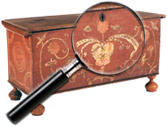Robert Hooper, 18th Century Marblehead Merchant
Born in 1709 to a tallow-maker in the fishing village of Marblehead, Massachusetts, Robert Hooper witnessed, and helped facilitate, the rise of this village into a place of significant influence and wealth in late 18th century New England. While it was an accident of birth and continued good health that allowed Robert Hooper’s life to span most of the 18th century, it was his diligence and wise investments that enabled him to accumulate great wealth and a remarkable collection of fine furniture. Although he lost most of his fortune later in life, it is the nation’s good fortune that so much of what he commissioned and collected survives in important government, museum and private collections.
For much of his life, Hooper was, in almost every sense of the word, “fortunate,” building his financial wealth through strategic marriages and through his dominance of the Marblehead fishing industry. The control of this vital industry made Hooper, like his numerous Massachusetts competitors and compatriots, an integral part of the British Empire’s “triangular trade,” as the fish he gathered helped supply the distant ports of the Empire and of Europe. Even though many British officials considered New England to be an insignificant part of the larger Empire, without the fish provided by Hooper and others, it would have been impossible to operate the incredibly lucrative plantations of the West Indies. Created by trade in fish, oranges, limes, and spirits, Hooper’s personal wealth was merely the accidental byproduct of a system designed to facilitate trade and increase the Crown’s revenue.
Much like those of his peers throughout the region, Hooper’s businesses benefited from the protection the British Royal Navy provided for his ships and from the lax enforcement of Navigation Laws that existed, on paper at least, to restrict his trade with foreign ports. Profiting from his shipping interests during the 1730′s and 1740′s, Hooper accumulated a significant fortune, one so large that it alone could have earned him the moniker “King Hooper.” Instead, the nickname, reportedly bestowed on him by his slaves and the fishermen with whom he traded, served as recognition of his reputation for personal integrity.* Unbeknownst to his admirers at the time, this regal nickname foreshadowed Hooper’s Loyalist sentiments during the impending Revolution.
During the 1750′s, Hooper possessed the largest merchant fleet in the British North American colonies, and he ranked among the colonies’ wealthiest citizens. If he was, indeed, “King” of Marblehead, Hooper’s actions demonstrated that he understood his community’s beliefs about the obligations of society’s “betters” to those less fortunate. In actions that epitomized Enlightenment ideals of republican virture, Hooper funded a school for indigent children, donated a fire engine to Marblehead, and served on several town and colonial committees, including one that protested royal taxes on oranges and limes. The irony of these actions became apparent only when many of his countrymen combined their commitment to Enlightenment ideals with their distaste for more vigorously enforced Imperial taxation and navigation laws and launched the American Revolution.
During the war, like many of Marblehead’s residents, King Hooper remained loyal to his namesake, and as a consequence of the economic disruption caused by the Revolution, his considerable financial fortune began to dissipate. After the war, while many Loyalists across the new nation were prevented from returning to their homes and reclaiming their real and personal property, Hooper’s previous good deeds and his sterling reputation easily outweighed his seemingly misguided political loyalties.
He lived in Marblehead, surrounded by luxury but confronted with declining fortunes until his death in 1790, when his considerable debts exceeded $144,000. As his contemporary William Bentley noted, Hooper “had long ago (been) the most eminent Merchant in the place (Marblehead), but by the events of war, became a bankrupt.” Nonetheless, his family continued to occupy the house (now owned by the Marblehead Arts Association) until 1819.
During his life, Hooper’s house and possessions provided public testimony to his status as one of the nation’s wealthiest men, and they continue to remind observers of the opulence and sophistication that many colonial New Englanders aspired for and achieved. Currently the U. S. Department of State showcases an ornate oxbow desk and bookcase, a case clock, and several other items from Hooper’s personal inventory in the nation’s most important Diplomatic Reception Rooms.
As Wendell Garrett noted in his A National Collection: Treasures of State, the furniture featured in these rooms serves an explicit purpose: “These pieces of craftsmanship are used to elucidate an important aspect of the early republic – the fact that America shared in the elegance and grandeur of the age of Enlightenment.”
courtesy of Skinner, Inc.
*In A County in Revolution: Essex County at the Dawning of Independence, by Robert N. Tagney, 1976, page 277, the author suggests that Hooper’s nickname came from the opulent carriage he used around town, one in which he “rode like a king.”
p4A.com note: a sidebar of interest to collectors, in the early years of the 20th century the famed antiques dealer Israel Sack Inc. held summer business hours at the Hooper mansion in Marblehead (Danvers, Massachusetts). The mansion still stands on its original location and is the home of the Marblehead Arts Association (www.marbleheadarts.org).
